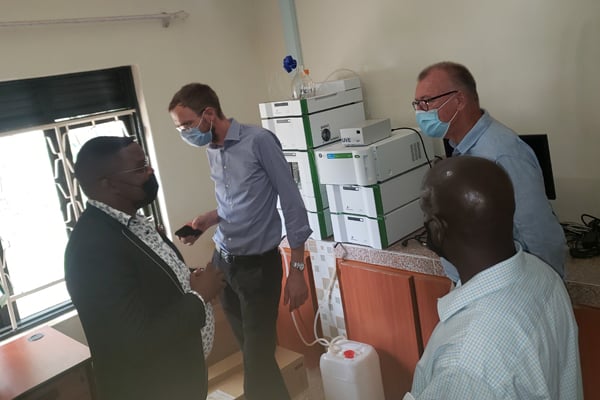UNBS to set up three regional labs

The deputy Danish Ambassador, Mr Henrik Jespersen (right), interacts with UNBS officials during the visit to the new laboratory in Gulu City on Wednesday. PHOTO / TOBBIAS JOLLY OWINY
What you need to know:
- Ms Catherine Ssekimpi, the executive director of TMEA, said there is a need to decentralise testing services to improve service delivery.
A state-of-the-art multi-functional laboratory being set up in Gulu City by the Uganda National Bureau of Standards (UNBS) could begin operating in two weeks, Daily Monitor has learnt.
The new laboratory in Pece, Gulu East Division, Gulu City (northern Uganda) is being established concurrently with those in Mbale (eastern Uganda) and Mbarara (western Uganda) cities.
Mr Aziz Mukota, the UNBS head of Chemistry Laboratories, on Wednesday said UNBS recently partnered with TradeMark East Africa (TMEA) and the Danish Embassy to procure and install laboratory equipment to carry out chemical and microbial analysis in identified commodities for exports across the country.
“UNBS currently offers the testing services only at the Kampala premises, and would now like to decentralise the testing services to be close to businesses engaged in priority value chains for exports in northern, eastern and western Uganda (Mbale, Gulu and Mbarara).”
“When traders or manufacturers have to travel long distances with the samples, the integrity of the samples is compromised in the process,” he said.
Mr Mukota made the remarks during an inspection of the laboratory in Gulu by Danish deputy ambassador, Mr Henrik Jespersen, and officials from TMEA.
According to the contracts between TMEA and suppliers of the lab equipment, UNBS is expecting to receive equipment worth $1.978m (about Shs7b) after the contracted suppliers deliver all the equipment.
“Equipment worth $494,980 (about Shs1,756b) have so far been received for the regional labs and $93,594 (about Shs332m) for Bweyogerere labs to test for sanitisers and face masks,” Mr Mukota revealed.
Ms Catherine Ssekimpi, the executive director of TMEA, said there is a need to decentralise testing services to improve service delivery.
While the labs start minimal operations at the end of December, Ms Ssekimpi said full operation is expected to kick off in March.
She urged UNBS to embark on massive sensitisation to create awareness about the presence of the facilities.
Mr Jespersen said the funding of the project was part of the Danish Embassy’s commitment to promote export industries in Uganda and guarantee consumer protection.
“You have seen some of the issues you have had with crops going to some of the neighbouring countries, it is important that Uganda is in a position to export things that are checked and have the appropriate standards,” he said.
Mr Jesperson added that the intervention would support the agricultural value chain and the development of the export industries.
He said: “Our target in this intervention is the dairy farmers, small traders and the bigger industries that are trying to export out of the country.”
The regional laboratories are equipped with digital thermocouples, turbidity metres, automated density metres, digital viscometre, refractometre benchtops, electronic colony counters, among others.
The labs
The laboratories will be used to test edible fats and oils, milk and milk products, fruits and vegetables, cereal and cereal products, animal products such as fish, meat, honey and horticultural products.
In the past five years, UNBS laboratories have witnessed a steady increase in the number of samples tested mainly due to increased economic activities in the country as well as a steady increase in regulatory activities against substandard products by the UNBS compliance directorate.




